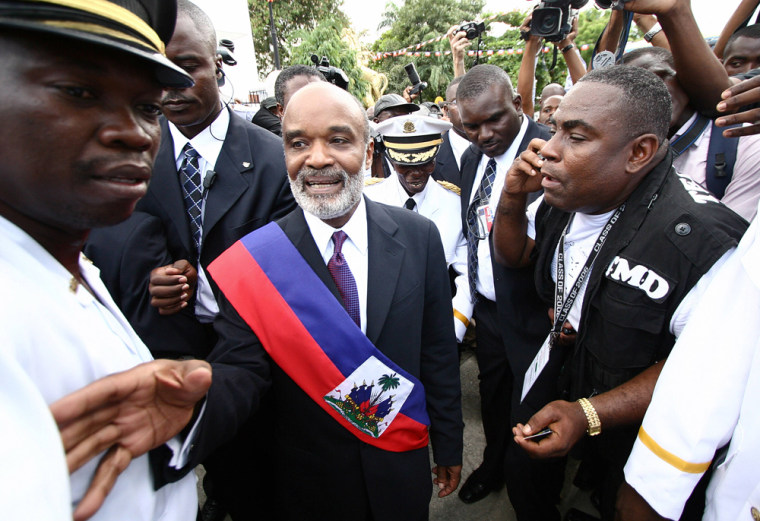Rene Preval, the only president in Haiti’s history to finish a five-year term, was sworn in Sunday to again lead the impoverished nation after decades of armed uprisings, lawlessness and foreign intervention.
In a brief ceremony, Preval took the oath of office in a sweltering, packed Parliament chamber, and the Senate leader placed on him the presidential sash of Haiti’s national colors — blue and red.
Afterward, he stood and waved as about 300 legislators and foreign dignitaries, including Florida Gov. Jeb Bush, Canadian Governor-General Michaelle Jean and actor Danny Glover, gave him a standing ovation.
In his inaugural address later outside the national palace, Preval urged unity among Haiti’s fractured society and a return to peace after the February 2004 revolt.
“We need to make peace through dialogue and talking to each other so we can decide where we want to go together,” Preval said. “If we don’t talk, then we will only fight and there will be no peace.”
Thousands cheered Preval, pressing up against the green iron gates surrounding the palace and waving Haitian flags as dozens of U.N. peacekeepers stood guard. Others danced and sang as traditional bands snaked through the crowd playing homemade horns and drums.
‘Help yourself’
Preval urged Haitians to help maintain security so the country could create jobs, build roads and hospitals and move forward “without the presence of foreign troops.”
“Haitian people, the solution to our problems is in our hands,” he said. “Please help me, help the country, help yourself.”
Preval replaces a U.S.-backed interim government appointed to lead this Caribbean nation after former President Jean-Bertrand Aristide fled into exile in 2004.
Onlookers gathered behind a line of heavily armed police and U.N. peacekeepers. Some in the crowd held aloft portraits of Aristide and called for his return from exile, chanting “Aristide’s blood is our blood!” and “We want him back!”
Preval, 63, was president from 1996 to 2001. He faces big challenges, including a corrupt state bureaucracy, a wrecked economy, roiling insecurity and the plight of prisoners.
Riots mar inauguration day
Before the inauguration, inmates rioted at Haiti’s main prison about a half-mile away from the Parliament building. Gunfire could be heard from inside the prison and about 100 inmates massed on the roof, holding what appeared to be two dead bodies. There was no immediate official word on casualties.
Haitian police and U.N. peacekeeping troops surrounded the prison. Gunfire was heard within its walls and scores of inmates massed on the roof holding what appeared to be two dead bodies.
The riot broke out at the national penitentiary, about a half-mile from the parliament building where Preval was inaugurated at midday.
Lurching toward democracy
Preval’s inauguration marked the return of this deeply divided nation to democratic rule, two years after his predecessor President Jean-Bertrand Aristide was ousted in a bloody revolt.
The United Nations has called on Haitian authorities to attend to the plight of prisoners. In March, the U.N. peacekeeping mission in Haiti condemned the jailing of thousands of people who have not been convicted of a crime.
Only 10 percent of some 4,000 prisoners have been convicted, U.N. officials said. The U.N. mission called on Haitian authorities to immediately appoint a commission to review each of the prisoners’ cases.
Delegations from some 40 countries attended the inauguration for Preval, who replaces a U.S.-backed interim government appointed to lead this Caribbean nation after Aristide fled into exile.
Challenges for Preval
Preval, a former Aristide ally and champion of Haiti’s poor, has pledged to unite the country’s fractured society and restore the peace that vanished in the aftermath of the February 2004 revolt.
Preval will have to overcome big challenges in addition to the plight of the prisoners — including a corrupt state bureaucracy, a wrecked economy and roiling insecurity.
The U.N. envoy to Haiti, Juan Gabriel Valdes, said one of Preval’s main priorities should be fixing the country’s broken justice system.
“In Haiti, impunity is almost total for many criminals who roam free while the innocent and those wrongly accused of a crime stagnate in prisons,” Valdes wrote in an editorial published Saturday in the Canadian newspaper Le Devoir.
Hope for the future
Jela Altius, a 31-year-old food vendor, said she wants Preval to improve security.
Haiti’s capital was gripped by a wave of kidnappings and killings after Aristide’s ouster, but officials say violent crime has dropped sharply since Preval’s victory in the Feb. 7 election.
“We want to be able to go out at any time of day and not worry that something is going to happen to us,” Altius said.
Among the foreign officials who arrived Saturday was Canadian Governor General Michaelle Jean, who was born in Haiti. Jean, who left Haiti with her family at age 11 to escape persecution by dictator Francois “Papa Doc” Duvalier, urged Haitians to work to maintain democracy.
“I think democracy has to prevail here, and I think it’s so important to bring that hopeful spirit back to Haitians,” Jean told reporters.
Talent for conciliation to be tested
Experts say Preval’s skills at governing and healing Haiti’s deep social rifts will largely determine whether the former French colony will move toward stability or remain mired in turmoil and despair.
Preval has begun reaching out to rival political parties in a bid to cobble together a legislative coalition in Haiti’s parliament, which has members from 16 political parties. He has also sought ties with members of Haiti’s business elite, some of whom opposed Aristide and campaigned against Preval.
“We’re hoping he’ll do what he says he will,” said Charles Henri Baker, a wealthy industrialist and the third-place presidential finisher. “If so, Haiti will be off to a good start.”
